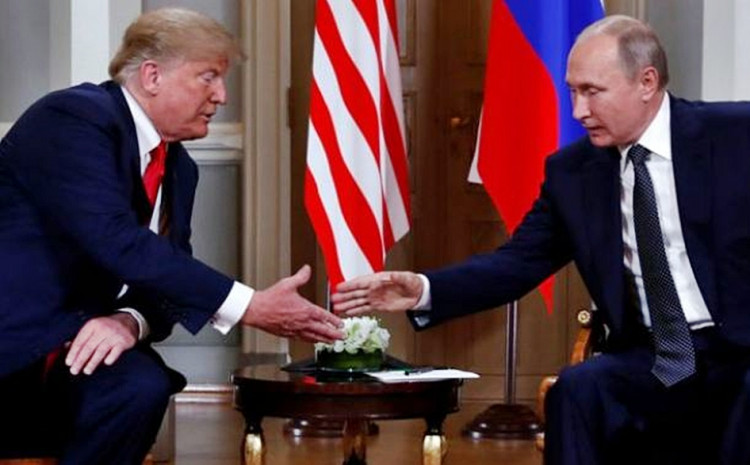Former President Donald Trump has suggested that the U.S. and Russia are engaged in discussions about ending the war in Ukraine, though it remains unclear whether Russian President Vladimir Putin has any real interest in negotiations. Nearly three years after Russia's invasion, Moscow's forces are advancing, while Ukraine faces shortages of troops and military supplies. Trump, who has repeatedly claimed he could broker peace, has indicated that "very serious" talks are already underway, though Kyiv has been left out of the process.
Putin has spoken favorably of Trump, calling him "clever and pragmatic" while reiterating false claims that the 2020 U.S. election was stolen. Trump, in turn, has referred to Putin as "smart" and suggested that a deal could be reached quickly through a combination of flattery and economic threats, including tariffs and oil price cuts. The Kremlin, however, has largely dismissed such threats and continues its military campaign in Ukraine with little domestic opposition.
"In the West, the idea came from somewhere that it's important to Putin to reach an agreement and end things. This is not the case," said Fyodor Lukyanov, chairman of the Council for Foreign and Defense Policies in Moscow. Putin has made clear that his objectives remain unchanged, including Ukrainian neutrality and restrictions on the country's military capabilities.
Ukrainian President Volodymyr Zelenskyy has warned that Putin is attempting to negotiate directly with Trump while sidelining Kyiv. "We cannot let someone decide something for us," Zelenskyy told The Associated Press, adding that any deal brokered without Ukraine's involvement would set a dangerous precedent for global security.
The Biden administration has emphasized the principle of "nothing about Ukraine without Ukraine," insisting that Kyiv must be included in any diplomatic process. However, Trump has not signaled that he would abide by this approach should he return to office.
Some Western officials have voiced concerns that Trump could pressure Ukraine into accepting a settlement favorable to Russia. "History won't look kindly on him if he's the man who gives this all away," said Sir Kim Darroch, former British ambassador to the U.S.
Putin's stance suggests that any talks with Trump would primarily serve as a diplomatic maneuver to weaken European resolve on Ukraine. The Russian leader has mocked European leaders, calling them "obedient lapdogs" to U.S. policy and predicting that Trump's return would allow Moscow to dictate terms.
Trump's previous engagements with authoritarian leaders have been scrutinized for failing to yield substantive agreements. His 2018 summit with Putin in Helsinki was widely criticized after he sided with the Russian president over U.S. intelligence assessments on election interference. Similarly, his 2019 summit with North Korean leader Kim Jong Un ended without securing limits on Pyongyang's nuclear program.
Meanwhile, the Trump administration has taken steps that benefit Moscow, including imposing sanctions on the International Criminal Court (ICC), which issued an arrest warrant for Putin over alleged war crimes. The move was welcomed by the Kremlin, with a Russian diplomat calling it "a gift to Moscow," according to The Moscow Times.
Additionally, Attorney General Pam Bondi has ordered the disbanding of a Justice Department task force that targeted Kremlin-linked oligarchs and enforced sanctions against Russia. While Bondi said the department would redirect its focus to countering drug cartels, critics argue the shift weakens U.S. efforts to hold Russia accountable.
Despite these actions, retired Gen. Keith Kellogg, Trump's envoy to Ukraine, has suggested that the administration may impose stricter sanctions on Russia to force Putin into negotiations. "You could really increase the sanctions," Kellogg told The New York Post, arguing that existing measures have not been fully enforced.
Trump has also proposed leveraging the U.S. oil industry to pressure Russia, suggesting that Washington could negotiate lower oil prices with OPEC+ allies to hurt Moscow's revenue. The Kremlin has dismissed this strategy, stating that its war in Ukraine is driven by security concerns rather than economic pressures.




